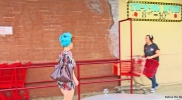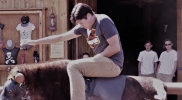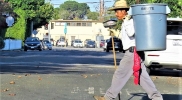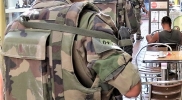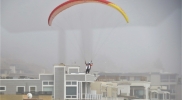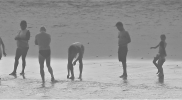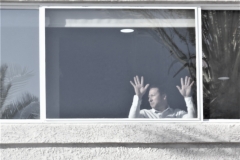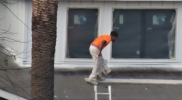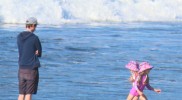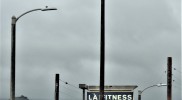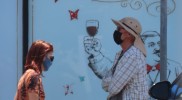|
|
Best Trivia - Philosophy
|
Favorite Trivia – DISASTERS & ACCIDENTS
|
| “One morning she [proprietor] woke me up at one o’clock by frantically tugging at my arm and pulling me to a window. An enormous zeppelin was going over our canal [in Hamburg]. It was beautiful and flying so low that I could hear a Strauss waltz from its radio. It was just strolling along up there. Two days later I read about it in the Herald Tribune. It was the then new ‘129,’ the ill-fated Hindenburg, and was flying over Hamburg as a campaign advertisement. It had risen from the ranks of the British ‘101,’ which had crashed in France. Germany bought the wreck and that same metal was used in the Hindenburg.”
Maud Parrish – Nine Pounds of Luggage
|
| “After he [Mark Twain] was rescued from drowning several times as a boy, Twain came to believe he led a charmed life. And in many ways, he did. During his days as a riverboat pilot on the Mississippi in the late 1850’s, Twain was scheduled to do a stint on a boat called the Pennsylvania. But his brother, Henry, offered to swap postings and Twain readily agreed. A few days later, a fire broke out on the Pennsylvania and the boat exploded. Henry was killed, and Twain spent the rest of his life haunted by the thought that he could have—perhaps should have—been in his brother’s place.”
Geary – The World in a Phrase: A Brief History of the Aphorism
|
| “Finished my reading about shipwrecks. The material should be organized into a systematic treatise. Cannibalism. . . The crew of the American ship Peggy was reduced to butchery in 1665 when she became impossible to steer while sailing from the Azores to New York and had to spend months as a plaything of the waves. Once the ship’s cat had been devoured as the last of their provisions, the crew decided to extend the lives of the survivors by killing one of their own. Against the will of the captain, who lay ill in his cabin, lots were drawn and a Negro slave on board was chosen. This suggests that the unfortunate man had been chosen in advance and that the lottery was merely a sham. He was slain at once.
“The body kept them alive for over two weeks. Then they had to settle upon a second victim, and this time the captain was in charge of drawing lots out of concern that it would otherwise take place without him. He wrote the names on small pieces of paper, threw these into a hat and shook it. The crew watched these preparations in silence, their faces pale and mouths quivering, their fright visibly etched on every feature. A man drew the piece of paper; the captain opened it and read the name: David Flat. The crew gave in to the captain’s request to postpone his slaughter until the eleventh hour of the next morning. At ten o-clock, when a large fire was already blazing and the cauldron in place on it, a sail came into view. It was the Susanne whose captain re-victualed the ship and took her in tow.” [February 7, 1945]
Ernst Jünger – A German Officer In Occupied Paris: The War Journals, 1941-1945
|
| “A few weeks ago, the helicopter we used every day in the Philippines had an accident as it was getting ready to lift off. The rotor came through the cockpit. The pilots were rather short. Dick told me if he and Francis had been flying it, the rotor would have sliced their heads off. The morning paper brings news that there has been a helicopter accident in Pagsanjan. A pilot, a film director and two others were killed while they were looking for locations right where we flew every day for months. One of the passengers was our production caterer. I remember how pleased he was with the dinner he served the night of the two hundredth day of shooting, the nude girl he sprung out of the silver aluminum foil box and the turkeys he got for Thanksgiving by conning some guys into buying them illegally at the American PX.” [January 16, 1978]
Eleanor Coppola – Notes on the Making of Apocalypse Now
|
| “In 1348 a wave of invaders scrambled down the mooring lines of arriving merchant ships. Hitching a ride in the warm fur of Asian rats, the common flea, each the size of a pinhead. These particular fleas were infected with bacteria called bubonic plague.
“Among humans, a single bite from an infected flea often triggered a raging fever, vomiting, and the eruption of oozing boils around the neck, armpits and groin. Two of three infected people would be dead within days, their corpses often left to rot as those able to flee the mysterious onslaught sought escape in the next village, only to fan fear and outbreak alike.
“The resulting pandemic, known as the Black Death, killed off a third of Europe’s population in just fifty years, including more than a million people in England alone. Soon, entire English estates were devoid of architectural workers. Children were left orphans. Churchmen, including many of the country’s remaining French speakers, died by the droves or abandoned their monasteries altogether. Thriving hamlets became ghost towns almost overnight. The resultant social and economic disruption was severe, breaking down class structure and driving mass migrations.”
John Pollack – The Pun Also Rises: How the Humble Pun Revolutionized Language, Changed History, and Made Wordplay More Than Some Antics
|
| “On March 18, 1937, a school building in the old community of New London, Texas, exploded without warning while classes were in session. Witnesses stated that the walls bulged and that the school’s roof lifted before everything crashed down, killing more than 295 students and teachers—ranking the disaster today as the third deadliest in Texas history (after a 1900 hurricane and a 1947 ship explosion). Further investigation showed that the school had used piped-in natural gas for heating, and that a leak had filled the building with a deadly, odorless mixture. When an instructor flipped on an electric sander at about three in the afternoon, the tiny spark caused the whole building to blow.
“Within weeks, new legislation decreed that all natural gas in Texas should be mixed with low concentrations of malodorants—extremely smelly chemicals, such as mercaptans, that immediately alert anyone to the presence of gas. It was an easy solution; any leak could then be detected by the human nose with plenty of warning. The practice of adding smelly chemicals to natural gas lines quickly spread worldwide . . .
“It wasn’t long before workers at the Union Oil company noticed a peculiar side effect of the scented gas. Whenever one of their remote lines sprang a leak, a group of turkey vultures would soon collect overhead, evidently detecting the mercaptans percolating in the atmosphere. The workers began looking for circling vultures when tracking down a leak, a technique that is apparently still used today.”
Noah Strycker – The Thing with Feathers: The Surprising Lives of Birds and What They Reveal About Being Human
|
| “Among the extant peoples least touched by civilization are the Moken. The Moken, who number between one and three thousand, are nomadic tribesmen and animists who live in the Andaman Sea of Indonesia. With a primal understanding of the ocean that rivals an oceanographer’s, the Moken are practically amphibious. They learn to swim before they walk, and they can lower their heart rate to stay underwater twice as long as we can . . .
“I bring the Moken up not simply to show that there are people who exist using what has the shape and feel of animal intelligence but rather to show what this same intelligence can do: though their village and boats were demolished, all but one of the tribe—a disabled man, who was unable to run—survived the tsunami in 2003 that took hundreds of thousands of lives. It seems that, on the day of the tsunami, an elder Moken fisherman named Salama Klathalay noticed forebodings of trouble—the tide receded abnormally, dolphins headed out for sea, cicadas on the land stopped their buzzy singing, so he alerted his fellow tribesmen, and they all climbed up a local mountain.”
Henry Alford– How To Live: A Search for Wisdom from Old People
|
| “Last year we were suddenly awakened, we being everyone in L.A., by the house not standing still. I saw the tv fall off the table and dance across the floor like a marionette. There was nothing for it but to wait. I had already explored fully the ways you can suffer thinking about earthquakes. It was one of the lessons of childhood.
“‘Now, do you believe in God?’ a friend telephoned immediately to ask. The sky was flashing like lightning and the rumble had barely subsided, but I’ll be damned before I’ll believe in God just because of earthquakes, I’ve seen where that can lead. ‘No,’ I said and hung up.
“An aftershock rolled under the house again and the man I was with trembled in terror. He had never thought about earthquakes and had only been in L.A. for a few months.
“‘Stand under the doorframe,’ I told him because he was grabbing his clothes and would probably run outside in a minute. The worst thing you can do is run outside, phone wires being what they are. The earth rocked beneath us like a cradle and if God wants me to believe in him, I’ll do it, but only for the Pacific Ocean and sunsets. Earthquakes are only earthquakes, but a good sunset . . . “
Eve Babitz – Eve’s Hollywood
|
|
“News today of a fearful tragedy at Lawrence, Massachusetts, one of the wholesale murders commonly known in newspaper literature as accident or catastrophe. A huge factory, long notoriously insecure and ill-built, requiring to be patched and bandaged up with iron plates and braces to stand the introduction of its machinery, suddenly collapsed into a heap of ruins yesterday afternoon without the smallest provocation. Some five or six hundred operatives went down with it—young girls and women mostly. An hour or two later, while people were working frantically to dig out some two hundred still under the ruins, many of them still alive and calling for help, some quite unhurt, fire caught in the great pile of debris, and these prisoners were roasted. It is too atrocious and horrible to think of.” [January 11, 1860]
The Hone & Strong Diaries of Old Manhattan – George Templeton Strong |
|
San Francisco Earthquake, April 18, 1906, The Great Fire:
“San Francisco’s fire chief, Dennis Sullivan, was fatally injured in the earthquake, and so the city lost at the inception of the disaster the person who might have directed subsequent efforts wisely. The earthquake broke many water mains, so fighting the fires became far harder than it could have been. In his absence, the firefighters were joined by the army, and the latter tried reckless experiments in using explosives to make firebreaks. There mistakes were many.
“One was the use of black powder, or gunpowder, in place of dynamite. The latter simply blows things up; the former tends to also ignite them. Thus many buildings were turning into burning, flying brands that spread the fire farther or started new conflagrations entirely. Another was setting the firebreaks too close to the existing flames, thereby simply breaking buildings up into more flammable debris. A third was setting explosives to buildings that contained chemicals, alcohol, and other highly flammable substances. A fourth was setting explosions that restarted or started fires in areas that were previously secure. And a fifth was keeping away from the flames the public who might have supplied the power to fight the fire by hand. . .
“Former fireman Dennis Smith reports in his San Francisco is Burning that by the second day the National Guard allowed citizens to fight fires, but the army persisted in evacuating, or evicting, them. . . The big post office still standing today at Seventh and Mission streets was saved because ten employees refused direct orders to evacuate and put out the flames with wet mail sacks. The U.S. Mint downtown was also saved by its own employees.”
A Paradise Built in Hell: The Extraordinary Communities that Arise in Disaster – Rebecca Solnit |
| “In the spring of 1997 [April 13], Eve [Babitz], fifty-three, was driving home from a family gathering [in the ’68 VW Bug that Steve Martin had given her years ago]. She struck a match to light a cigar and dropped the match on her skirt. Seconds later, she was engulfed in flames. She suffered third-degree burns over half her body . . . (Her face had been spared, as had her feet, thanks to UGG’s.) . . . The doctors gave her a fifty-fifty chance of survival. The odds broke in her favor, and she pulled through. Her life, though, was forever altered. Whether from shame or pain or plain lack of interest, she stopped going out, turned increasingly inward, increasingly reclusive . . .
“I learned from Laurie and Mirandi [Eve’s sister] that a number of her burns didn’t fully heal, are still open. And her body can no longer efficiently rid itself of heat because the fire destroyed so many of her sweat glands. Sitting in a chair at a table for an extended period, especially in warm weather, must be excruciating . . .
“Mirandi: ‘She was wearing an Indian skirt, very, very thin, and it burned up like tissue paper. Her panty hose melted into the skin of her legs. She stopped the car and rolled on the grass and actually set the grass on fire. But she did manage to put herself out. Then she got back into the car and drove to Wilton Place. I was there because I’d taken Mother home. When she pulled into the driveway, I was talking to Mother’s neighbor, Nancy Beyda. I saw Eve, and I was aghast. She was naked from the waist down, and the lower half of her was just this awful charred orange. She was clutching a wool sweater to her crotch, which, if you can believe it, is what saved her crotch. Good wool is hard to burn. “It’s okay,” she said to me. “I’ll put some aloe on it. I can still go dancing.” I guess she was supposed to have some kind of date that night with Paul. I followed her into the house and called an ambulance.’
“Eve spent six weeks in the ICU, several months after that in a rehab hospital. She survived two twelve-hour operations in which the skin from her scalp, shoulders, back, and arms was grafted onto her midsection, groin, and legs; the removal of the hundreds of staples and stitches that were keeping those grafts in place; hallucinations from ICU-induced psychosis; bedsores that had to be cut off with a knife; relearning to walk. And all while kicking smoking [cigarettes]. The doctors tried to help her cope with the withdrawal symptoms by giving her a nicotine patch, but they couldn’t because there was nowhere to put it, not a single inch of undamaged skin.
“Eve: ‘If you have third-degree burns, your nerve endings are gone, but I still screamed in pain. I was always screaming in pain, morning and night, drugs or no drugs. If I sat up in my bed, it felt like I was sitting on crushed glass . . .’
“Friends of Eve, the group called itself—arranged a benefit at the Chateau Marmont. An auction was staged with works donated by, among others, Ed Ruscha, Kenny Price, Larry Bell, Billy Al Bengston, John Baldessari, and Dennis Hopper . . .
“Prior to the benefit, Friends of Eve had sent out a letter soliciting donations through the Allisa Ann Ruch Burn Foundation. That’s what brought in the big money. (The Foundation was tax-exempt.) Laurie reported back to Eve, still at Country General, told her how Steve Martin and Harrison Ford had kicked in $50,000 apiece. A prostrate Eve raised her head. Through dry, cracked lips she croaked out, ‘Blow jobs,’ before collapsing on the pillow.”
Lili Anolik – Hollywood’s Eve: Eve Babitz and the Secret History of L.A.
|

Comments are closed.
|
|


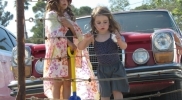


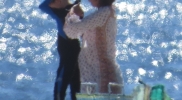
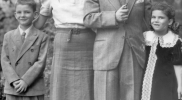
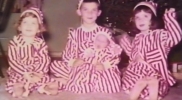




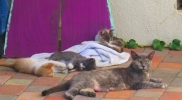
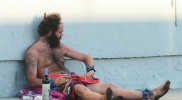
![[000015] [000015]](https://beforetheblog.com/wp-content/gallery/kids/thumbs/thumbs_000015.jpg)
